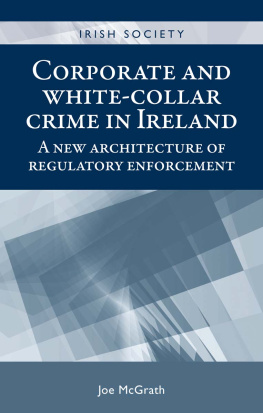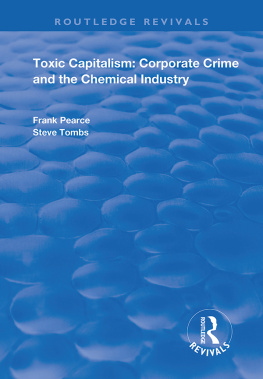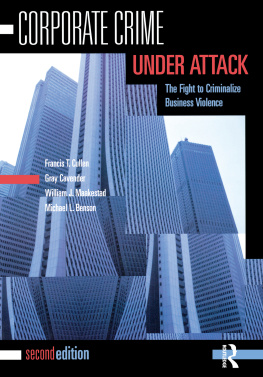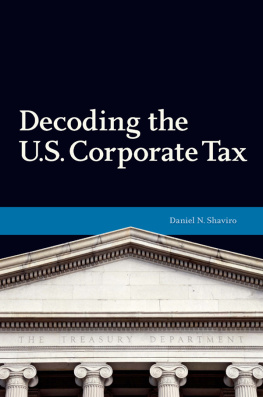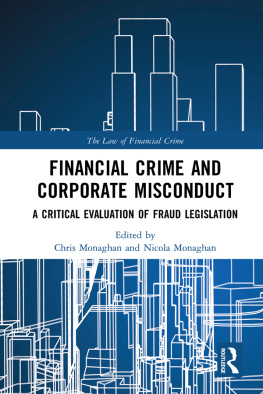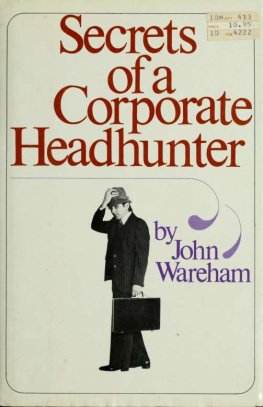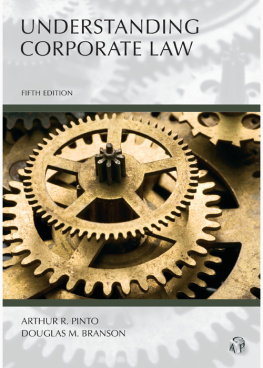
CORPORATE CRIME
Law & Society Series
Ancient Law
Henry Sumner Maine
with a new introduction by Dante J. Scala
An Introduction to the Sociology of Law
Nicholas S. Timascheff
with a new introduction by A. Javier Trevio
The Common Law
Oliver Wendell Holmes
with a new introduction by Tim Griffin
Corporate Crime
Marshall B. Clinard and Peter C. Yeager
with a new introduction by Marshall B. Clinard
Critique of the Legal Order
Richard Quinney
with a new introduction by Randall G. Sheldon
Fundamental Principles of the Sociology of Law
Eugen Ehrlich
with a new introduction by Klaus A. Ziegert
General Theory of Law and State
Hans Kelsen
With a new introduction by A. Javier Trevio
Penal Philosophy
Gabriel Tarde
with a new introduction by Piers Beirne
Punishment and Social Structure
Georg Rusche and Otto Kirchheimer
with a new introduction by Dario Melossi
Sociology of Law
Georges Gurvitch
with a new introduction by Alan Hunt
The General Theory of Law and Marxism
Evgeny Bronislavovich Pashukanis
with a new introduction by Dragan Milovanovic
The Social Reality of Crime
Richard Quinney
with a new introduction by A. Javier Trevio
Corporate Crime
Marshall B. Clinard
Peter C. Yeager
with the collaboration of Ruth Blackburn Clinard
With a new introduction,
"Corporate Crime: Yesterday and TodayA Comparison,"
by Marshall B. Clinard
Originally published in 1980 by The Free Press.
Published 2006 by Transaction Publishers
Published 2017 by Routledge
2 Park Square, Milton Park, Abingdon, Oxon OX14 4RN
711 Third Avenue, New York, NY 10017, USA
Routledge is an imprint of the Taylor & Francis Group, an informa business
New material this edition copyright 2006 by Taylor & Francis.
All rights reserved. No part of this book may be reprinted or reproduced or utilised in any form or by any electronic, mechanical, or other means, now known or hereafter invented, including photocopying and recording, or in any information storage or retrieval system, without permission in writing from the publishers.
Notice:
Product or corporate names may be trademarks or registered trademarks, and are used only for identification and explanation without intent to infringe.
Library of Congress Catalog Number: 2005045970
Library of Congress Cataloging-in-Publication Data
Clinard, Marshall Barron, 1911
Corporate crime / Marshall B. Clinard & Peter C. Yeager; with a new
introduction by Marshall B. Clinard.
p. cm.(Law and society series)
Originally published: New York: Free Press; London: Collier MacMillan
Publishers, 1980.
Includes bibliographical references and index.
ISBN 1-4128-0493-0 (paper: alk. paper)
1. Commercial crimesUnited States. 2. Corporation lawUnited States
Criminal provisions. 3. CorporationsUnited StatesCorrupt practices.
I. Yeager, Peter C. II. Title. III. Series.
KF9350.C58 2006
345.73'0268dc22
2005045970
ISBN 13: 978-1-4128-0493-6 (pbk)
To Edwin H. Sutherland (1883-1950), pioneer in research on corporate crime
Corporate Crime: Yesterday and Today A Comparison
'It has always seemed strange to me," said Doc. "The things we admire in men, kindness and generosity, openness, honesty, understanding and feeling are the concomitants of failure in our system. And those traits we detest, sharpness, greed, acquisitiveness, meanness, egotism and selfinterest are the traits of success. And while men admire the quality of the first they love the produce of the second."
John Steinbeck, Cannery Row
Corporate Crime, published in 1980, is the first and still the only comprehensive study of corporate law violations by our largest corporations in the Fortune 500. The book laid the groundwork for the analyses of important aspects of corporate behavior and definitions to study corporate crime and found ways of locating corporate violations from various sources and even drew up measures of the seriousness of crimes. Much of this book still applies today to the corporate world and its illegal behavior.
This new introduction discusses the development of a criminological interest in corporate crime, explains the nature of corporate crime, and discusses a number of issues involved in its study and concludes with a comparative view of corporate crime twenty-five years after the publication of Corporate Crime.
Since the founding of the country and the chartering of corporations, serious unethical and law violations have characterized many large corporations. These have been the subject of journalists and other writers and even of an important sociologist, E.A. Ross, who, nearly 100 years ago directed attention to unscrupulous business operators whom he termed "criminaloids" (Ross, 1905). The first attempt to do a research study of corporate crime was made in 1949 by Edwin H. Sutherland in his White Collar Crime (Sutherland, 1949).
Things started to happen beginning in the 1960s due largely to consumer groups and others who strongly emphasized the need for more corporate social responsibility. This concern resulted in the creation of the National Highway Traffic Administration in 1966, which made it possible for the government to intervene in auto safety problems that the industry had ignored but resulted in needless deaths and tens of thousands of injuries. The Occupational Safety and Health Administration came into being in 1970 to regulate the safety of the workplace and to protect the workplace from harmful chemicals and other substances. Also, in 1970, the Environmental Protection Agency was created to control air, water, and chemical pollutants. After studies revealed a tremendous number of injuries to consumers from the use of unsafe corporate products, the Consumer Product Safety Commission came into existence in 1972 to ban the sale of unsafe and defective products. In 1977, in order to prevent widespread bribery of foreign officials by American corporations, the Foreign Corrupt Practices Act was passed. Already in existence was the Sherman Antitrust Act of 1890. The Food and Drug Administration was created in 1906 to protect consumers from impure foods and dangerous drugs and cosmetics.
Crime can be divided into three main types: conventional or ordinary; occupational; or organizational. Conventional includes crimes of violence, such as assault, rape, and murder, but mainly consists of property crimes such as theft, burglary, and robbery. Most of these are committed by persons of the lower and blue-collar classes. In occupational crime we find entirely different illegal behavior. Such crimes are committed by persons of the middle and upper social classes. Occupational crime involves the violation of law in the course of activity in a legitimate occupation. It is often referred to as "white collar crime" because the crimes are committed by individual businesspersons, politicians, government employees, doctors, pharmacists, lawyers, and labor union officials. Occupational crime also includes blue-collar workers in connection with their occupations, such as those by plumbers and auto mechanics. Finally, there is organizational crime, which is committed by large entities that use illegal methods to obtain a goal. Organizational crime is committed by large corporations, an industry, labor unions, and even a church hierarchy. Organizational crime, such as corporate lawbreaking, is carried out within a complex system, of boards of directors, presidents, chief executive officers (CEOs), middle managers, and supervisors.


